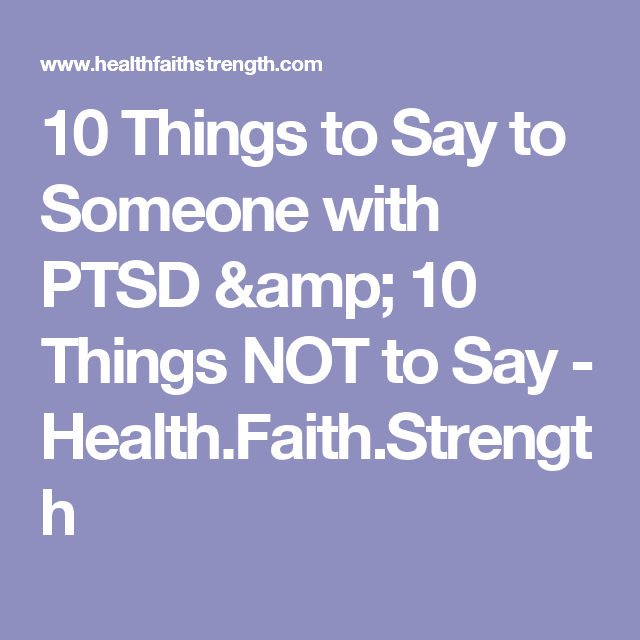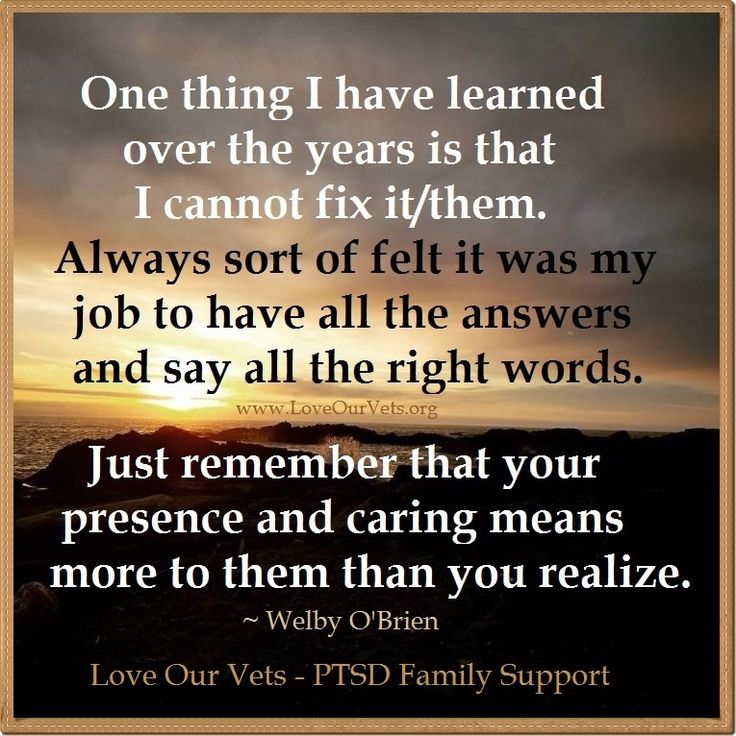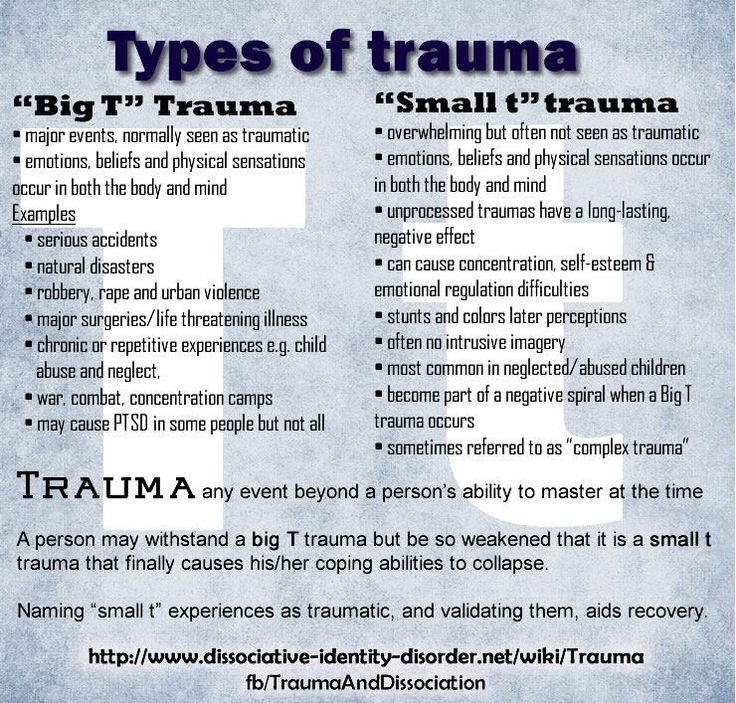Talking About The Trauma Can Be Important
- Allow the person to talk about what happened, even if they become upset. Just be calm yourself and listen carefully getting upset too doesnt help.
- Dont insist on talking if the person doesnt want to. They may need time to be alone with their thoughts. Tell them you are there to listen whenever they feel ready.
- Reassure them you care and want to understand as much as possible about what happened to them. They may say you cant possibly understand what they went through and shut you out. If they take this approach, they risk becoming isolated from their support networks. Be patient and see what else you can do to help.
- Try to make sure there is someone else they can talk to if they dont want to talk to you about it.
- If there are some difficult decisions to be made, talk about the situation with the person and help them to identify the different options. However, dont make the decision for them. Also, if it is only a short time after the traumatic event, suggest that it might be a good idea to wait a little longer before making a decision.
Tip : Support Treatment
Despite the importance of your love and support, it isnt always enough. Many people who have been traumatized need professional PTSD therapy. But bringing it up can be touchy. Think about how youd feel if someone suggested that you needed therapy.
Wait for the right time to raise your concerns. Dont bring it up when youre arguing or in the middle of a crisis. Also, be careful with your language. Avoid anything that implies that your loved one is crazy. Frame it in a positive, practical light: treatment is a way to learn new skills that can be used to handle a wide variety of PTSD-related challenges.
Emphasize the benefits. For example, therapy can help them become more independent and in control. Or it can help reduce the anxiety and avoidance that is keeping them from doing the things they want to do.
Focus on specific problems. If your loved one shuts down when you talk about PTSD or counseling, focus instead on how treatment can help with specific issues like anger management, anxiety, or concentration and memory problems.
Acknowledge the hassles and limitations of therapy. For example, you could say, I know that therapy isnt a quick or magical cure, and it may take a while to find the right therapist. But even if it helps a little, it will be worth it.
Encourage your loved one to join a support group. Getting involved with others who have gone through similar traumatic experiences can help some people with PTSD feel less damaged and alone.
Encourage Them To Seek Treatment
Its beyond your control to make someone seek treatment. If they are ready or are considering treatment, you can encourage them along the way, however.
Research some of the treatment options available for PTSD. Look for treatment providers and programs that specialize in PTSD. Explore the benefits of treatment and, when your friend is ready, share what you come up with.
Don’t Miss: A Beautiful Mind Schizophrenia Symptoms
Offer Support After A Traumatic Or Distressing Event
- Make time to be with the person and make it obvious that you are available. Sometimes, there can be a tendency to want to move someone on before they are ready, because the traumatic experience makes us feel uncomfortable. Try to avoid doing this. People who have had a traumatic experience can feel very reassured by human contact.
- Dont take their feelings to heart. They may be irritable, depressed, angry or frightened. Strong feelings and emotional outbursts are common try not to take it personally. It is important to recognise that they have had a stressful experience and that their reactions are normal and will subside in time.
- You can help by reassuring the person that their reactions are normal.
- Offer practical support. You could do the housework or the grocery shopping for them, or pick up their children from school.
- Encourage the person to take good care of themselves, for example, by eating well, avoiding alcohol, drugs or stimulants, and by attempting to maintain regular sleeping habits.
- You may need to let the person have time by themselves.
- Let them know you are there for them without judging.
- Suggesting to a person that they maintain regular daily routines and habits can be helpful as well.
Mirror Back The Comments They Make To You

According to Dr. Hokemeyer, the safest thing to do when comforting a friend with PTSD is to mirror the comments they have said to you:
If they say, ‘I’m terrified,’ mirror back those exact words: ‘You’re terrified.’Then manifest some nonassertive physical comfort: ‘Is it OK if I hold your hand?’The overall point is to create a nonjudgmental frame for them to have their experience, and hold it until it passes.
Also Check: Do Bipolar People Hear Voices
I Will Support You In Every Way That I Know How
This one is more about actions than words. Do enjoyable things with your loved one, and encourage them to try to do at least one enjoyable thing each day. You may need to help them come up with some ideas. Try asking them what activities they used to enjoy before the traumatic event, or making some suggestions. As long as you dont try to plan the activities for them, it could help.
You May Like: Long Word Phobia
Help Them To Relax And Get Involved In Activities
- Try to involve the person in physical activity, such as walking or swimming. Exercise burns off stress chemicals, reduces muscle tension and encourages better sleep.
- While the person needs to spend some time alone, help them to strike a balance. Socialising even low-key events such as sitting around with friends can help to reduce stress levels.
- Laughter is a wonderful antidote to stress. Find ways to help them to smile or laugh.
If at any time you are worried about your mental health or the mental health of a loved one, call Lifeline 13 11 14.
Read Also: What Is The Percentage Of Soldiers With Ptsd
Leave The Past Behind
Unfortunately, its not that easy for the human mind to leave the past behind, especially when the past holds something that has shaken the very core of your personality. When something traumatic happens, the brain registers the event to prevent it from happening again. Thats why some memories will stick and remain with us forever.
In short, the past isnt something that we should forget or put behind, but understand, accept and integrate into our experience.
Loosen Up A Bit Youre Too Uptight
Telling someone with PTSD to loosen up is like telling someone with depression to smile more often.
The reason why people whove been through traumatic events seem uptight is that they shield themselves from anything that might trigger that painful memory. For them, loosening up means letting their guard down, something for which they might not feel ready yet.
Also Check: How Often Is Schizophrenia Misdiagnosed
Supporting Someone With Ptsd Or C
When a friend or family member has PTSD or C-PTSD, it affects you too.
The symptoms of PTSD can be very difficult to live with, and the changes in your loved one can be can be scary, upsetting and overwhelming.
You may worry that things wont ever go back to the way they were before. Youre desperate to help them and make them better. At the same time, you may feel angry about whats happening to your family, and hurt by your loved ones distance and new emotions. The symptoms of PTSD can even lead to job loss, substance abuse, alcohol misuse, and other problems that affect the whole family. Its a stressful situation all around one that can leave you feeling helpless and confused.
Its hard not to take the symptoms of PTSD personally, but its important to remember that a person with PTSD may not always have control over their behaviour. Your loved ones nervous system is stuck in a state of constant alert, making them continually feel vulnerable and unsafe, or having to relive the traumatic experience over and over. This can lead to anger, irritability, depression, mistrust, and other PTSD symptoms that your loved one cant simply choose to turn off.
As you go through this time with a loved one with PTSD or C-PTSD, some of the most important things to remember are:
You Must Care For Yourself
Caretakers in relationships with people with PTSD often forget to take care of themselves.
I developed guilt associated with personal fulfillment or enjoyment, because its easy to get sucked into an unhealthy cycle.
When I wanted to hang out with friends without having to spend an hour talking D. down or not check in consistently while I was traveling for work to let him know I was safe, I felt guilty.
The partner of someone with PTSD will have to be strong a lot of the time. To do this, you must take care of your own mental health.
Wen agrees. When youre in a caretaker role, you have to put the mask on yourself first, she says. It must be a conscious effort to carve out time for yourself. The caretaker has to stay strong if they are to become a support system, and they need to have support and healthy outlets to maintain that.
After years of baby steps forward and monumental steps back, I ultimately made the decision to end the relationship.
It wasnt because I dont love D. I love him and miss him every moment.
But the issues surrounding PTSD that needed to be addressed called for dedicated commitment, time, and the help of a professional things he didnt say he was opposed to. Still, he never made the choices to show he was ready.
The guilt, sadness, and feeling of defeat were all encompassing. For two months I barely left my apartment. I felt like I failed him.
Don’t Miss: What Percentage Of Disability Is Ptsd For The Va
What Should You Not Say To A Complex Ptsd
10 Things Not To Say To Someone With CPTSD
- It wasn’t that bad, was it?
- That happened in the past, why are you still upset?
- You’re overreacting. It’s been years now. Get over it.
- You’re too much right now.
- What’s wrong with you?
- I don’t believe anything you’re saying.
- You are crazy. You are dramatic.
How To Talk With Someone Who Has Ptsd

When someone who has posttraumatic stress disorder tells you about the illness, she also entrusts you with an important piece of her life. For most people, having PTSD is not something that pops up in casual conversation. Even for someone who has PTSD who is ready to talk about their experience fears the possible unsupportive response. I’m convinced that in most situations, people simply don’t know how to react to PTSD disclosures, and are reluctant to ask. Here is what I’d like everyone to about talking with someone who has PTSD.
You May Like: Can You Grow Out Of Schizophrenia
Didnt This Happen A Long Time Ago
Asking this question is like saying, You should have been over it by now. Its definitely something you dont want to say to someone whos already having a hard time going about his/her daily life.
According to the National Institute of Mental Health, it takes 6 to 12 weeks of psychotherapy for someone with PTSD to achieve recovery. But keep in mind this is just a rough estimate.
How To Help Someone With Ptsd Episode
PTSD episodes will inevitably happen as you help your loved ones work through their issues. Learning how to identify triggers and symptoms of an episode will ensure that you know how to handle the episode and avoid the initial onset. Triggers usually consist of people, smells, sounds, sites, anniversary dates, and physical distresses associated with the incident.
One of the most common types of PTSD episodes is a flashback. A person will feel disconnected from the present during a flashback and find themselves reliving the traumatic experience. The best thing you can do in this case is to find a way to bring your loved one gently back to reality without startling them. This can mean helping them slow their breathing, asking them to recognize objects in the room to ground them, and reminding them that although their flashback feels real, they are in a safe place, and the event is not repeating itself. Never touch the person before asking them first, as doing so may be sensed as aggression and further remove them from reality.
Also Check: How To Help Eating Disorders
Get Informed About The Effects Of Trauma
Although the vast amount of information can feel overwhelming, the first step in helping your loved one is to get informed about trauma. A general understanding of what trauma is and how it can impact lives can go a long way in helping.
While you dont need to know everything about trauma to help your loved one, you need to be informed.
The term trauma doesnt just mean PTSD. Trauma is often used as an umbrella term that can refer to the traumatic event itself, extremely high levels of general stress in response to an event, or PTSD . Some people recover quickly from a traumatic event, but others may have lasting difficulties.
The American Psychological Association describes trauma as an emotional response to a terrible event like an accident, sexual assault, or natural disaster.
Complex trauma refers to a particular set of symptoms resulting from what may often be multiple events, such as physical, emotional, or sexual abuse. The stress of complex trauma can negatively affect a persons relationships, work life, and physical health.
Severe traumatic experiences can cause the condition PTSD. According to the National Institute for Mental Health , PTSD is defined as a condition that develops in some people whove experienced a shocking, frightening, or dangerous event.
After experiencing a traumatic event, people may have different emotional responses. Some of the more common responses to trauma are:
Is Ptsd A Disability
If you have a mental health condition that has a long-term effect on your day-to-day life, then this is considered a disability. NDIS covers PTSD when it is classified as a psychosocial disability. If your loved one lives with a significant disability that is likely to be permanent, they may qualify for NDIS support. Feel free to reach out to our team at Maple Community Services for information on PTSD support services.
Also Check: Can A Nightmare Give You Ptsd
Eliminate Confusion About Ptsd
Be prepared to give your friend or family member the basics on PTSD. Tell them what symptoms commonly occur in PTSD and why. If you are telling someone who is going to be providing you with social support, it is important that they have a good foundation of knowledge on PTSD. They need to understand why certain symptoms and behaviors occur, what they look like and how they can be addressed.
What Should I Know About Participating In Clinical Research
Clinical trials are research studies that look at new ways to prevent, detect, or treat diseases and conditions. Although individuals may benefit from being part of a clinical trial, participants should be aware that the primary purpose of a clinical trial is to gain new scientific knowledge so that others may be better helped in the future.
Researchers at NIMH and around the country conduct many studies with patients and healthy volunteers. Talk to your health care provider about clinical trials, their benefits and risks, and whether one is right for you. For more information, visit NIMHâs clinical trials webpage.
Don’t Miss: How To Help Someone With A Panic Attack Over Text
Create A Sense Of Safety
Stability is deeply important for veteransstruggling with PTSD. While you cannot always drop everything at a momentsnotice, you should take care to be a consistent, steady presence in your lovedones life.
Respect the veterans privacy and understand that everyone has their own timing for recovery. Treat everything your loved one tells you as entirely confidential.
Encourage Specialized PTSD Treatment
If your loved one has not already sought andenrolled in specialized treatment for PTSD in veterans, encourage them to doso. This can help minimize the symptoms of PTSD but also reduce the long-termrisk of developing additional mental-health conditions and symptoms.
Do some research into the different treatment options for PTSD in veterans. This will not only help you understand what your loved one is experiencing, but also help you understand how to communicate with them.
Some of the different PTSD treatments forveterans and military members include:
- Medication, such as anti-anxiety medication or antidepressants
- Counseling and talk therapy, either one-on-one or in the form of group therapy, which take many forms:
Self Care for Family & Loved Ones
PTSD Resources
Shouldn’t You Be Over It By Now

There are treatments for PTSD, but none are quick fixes. According to the U.S. Department of Veterans Affairs National Center for PTSD, there are a number of treatment options, including various therapies and medications. People often work on treatment throughout their lives, possibly taking medications such as antidepressants for months or even years. In addition, handling triggers can be a life-long challenge.
“There is no universal timeline for when triggers get easier to deal with,” Lea Grover, a sexual assault survivor, told Health. Grover experienced sexual assault when they were 14 years old and again at 20 years old. Grover said they didn’t know they had PTSD until about 18 months after the second assault. Grover had their first flashback while in pain after dental surgery.
Read Also: How Does A Panic Attack Happen